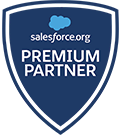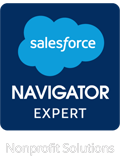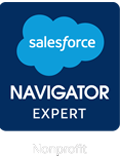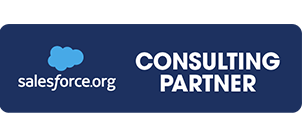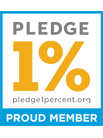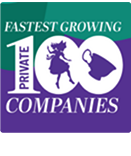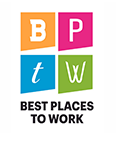10 Simple Steps for Using an RFP to Find a Salesforce Consultant
Submitting an RFP that helps you vet potential Salesforce consulting partners while also clearly describing your organization’s needs can be challenging. At the RFP stage, you may not know exactly what your technical requirements are, and it can be difficult to know what to ask or whom to trust.
Over the years, we’ve seen many organizations struggle with this process. While there’s no one-size-fits-all formula, implementing a few clear steps can go a long way toward future project success.
Let’s start by defining the most common terms used in Salesforce projects.
RFP vs. RFI
RFI (Request for Information): A short document (typically 1–2 pages) that allows you to qualify a partner based on relevant experience, history, stability, and compatibility.
An RFI is a great way to identify a group of interested consultants who are a good cultural fit. It’s concise, but when structured correctly, it saves time on both sides and helps you vet whom to invite to the RFP round.
RFP (Request for Proposal): A longer, more detailed document that allows your organization to outline specific requirements around budget, timeline, and features.
Responses are typically requested in a standardized format so proposals can be evaluated fairly. Strategy and business objectives are outlined so that the risks and benefits of the engagement can be identified upfront.
Now that you understand the difference, let’s dive into our top 10 tips to guide your process.
1. Start with an RFI
For larger projects, an RFI is an excellent way to assess cultural fit with potential consultants. Here's a basic RFI outline:
- Statement of Purpose: Why are you seeking support from an outside firm? Clearly articulate your goals and the values you would like to see in a partner.
- Response Guidelines: When do you want a response? In what format, and to whom? Include the relevant contact information.
Consider your organization's timelines: Work backwards from when you would ideally have a solution in place and allow for a reasonable time for firms to respond. - General Questions: What key factors will influence your decision? Examples include firm size, number of locations, service offerings, business history, case studies, and more. Ensure your questions are thoughtful and will genuinely inform your selection.
- Project-Specific Capabilities: Request information about relevant deliverables, tools, or platforms the project may require.
- Open-Ended Input: Include space for respondents to share any information they believe is relevant but not directly requested.
- Process Overview: Clearly outline your selection process, how many firms will advance to the RFP round, and provide a point of contact for any questions.
- Fine Print: If your RFI includes sensitive information, be sure to get a non-disclosure agreement (NDA) signed before sending it out.
2. Be clear on goals and objectives
Before hiring a consultant, clarify the business need behind each requirement. Build internal alignment for major investments, and weigh the potential risks and opportunities.
3. Do your homework
There are over 1,000 consulting partners listed on the Salesforce AppExchange. Ask peers in your nonprofit network for recommendations. If you're purchasing licenses from Salesforce, your Account Executive can also recommend partners based on what partners other clients might have used.
Educate: Watch demo videos, read case studies, and research how other nonprofits use Salesforce. Whether you’re planning a full Nonprofit Cloud (NPC) migration, a system optimization, or a tailored assessment, understanding common use cases will strengthen your approach.
Our team specializes in supporting nonprofits through every phase: from strategic planning and platform assessment to implementation and long-term optimization.
4. Set some limits
Communicating with dozens of consulting firms can be overwhelming. Aim to identify 5–10 RFI respondents, which should yield 2–3 strong candidates for the RFP round.
5. Make sure your RFP covers the basics
At a minimum, your RFP should include:
- Questions about the firm’s history, size, and stability
- Clear proposal instructions and response deadlines (10–15 business days minimum)
- A description of your current situation
- A list of detailed project requirements
- Questions about relevant expertise (e.g., training, workflow automations, Communities/portal development)
- Standard hourly rates by role
- Requests for case studies or samples of past work
- References
- A budget range to help ensure alignment
6. Don't depend solely on the document response
Pair your RFP with interviews, by phone or in person, to ensure consultants can deliver on their proposals. Allow for consultants to challenge assumptions in your RFP and to suggest different approaches that still align with your project goals.
Choosing the right consultant is like choosing a doctor: you wouldn’t rely solely on paperwork and price. During interviews, speak directly with the people who would work on your project. Trust your instincts. A good fit goes beyond skills; it's about communication, values, and collaboration, and technical expertise; it’s also about alignment in values and approach.
7. Involve the right people
Projects can go off track if the right stakeholders aren't involved early. Think carefully about who will be affected, who needs to approve decisions, and who will lead the project internally. Consider how change is best affected in your organization and ask consultants for their perspective on change management
8. Clarify your decision-making process
Before reviewing RFP responses, define how you’ll choose finalists. Consider using scorecards or polls to standardize your decision-making. Once you’ve made a choice, notify all participants and, when possible, offer constructive feedback to those who weren’t selected.
9. Think long-term
Technology evolves quickly. The system you build today may not meet your needs five years from now. Choose a partner you trust to grow with you. If you're unsure about a full commitment, consider starting with a paid discovery or assessment phase.
Also, ask about ongoing support and training—great consultants want to empower you, not create dependency.
10. Be open to adjustments
Since RFPs often encompass larger organizational change, be open to phased approaches and assessments to ensure we're building effectively and holistically toward your vision of a comprehensive system that spans departments and functions.
Ready to submit your RFP for a Salesforce project?
Ready to submit your RFP for a Salesforce project? While the process may seem challenging, these ten tips will guide you toward finding the right consulting partner for your needs. Remember that selecting a consultant is about building a relationship that evolves with your organization over time. Since 2006, Idealist Consulting has helped numerous nonprofits navigate this journey successfully. We'd be happy to review your RFP and discuss how we can support your Salesforce implementation goals.










